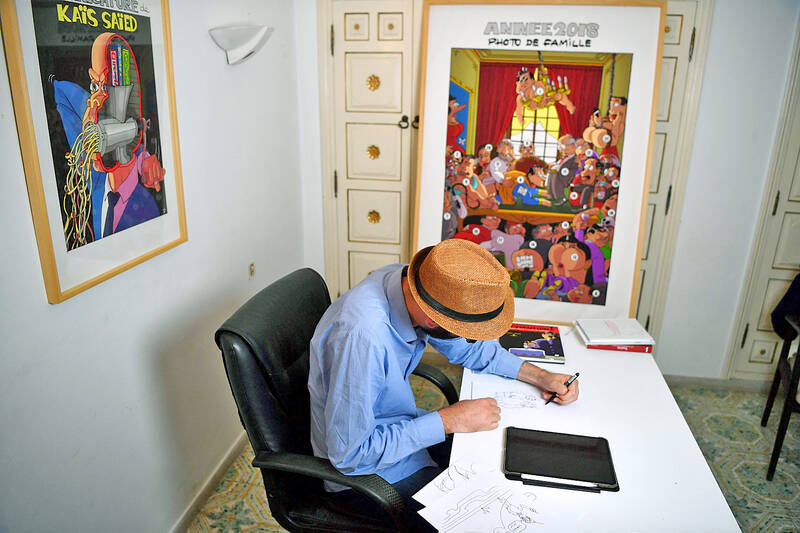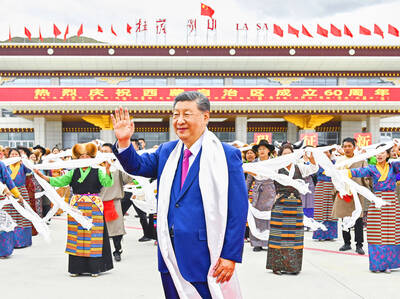Tunisia’s top cartoonist does not hesitate to compare Tunisian President Kais Saied with Hitler. It is a sign of the country’s current political climate, but such vehemence is nothing new for the artist who has regularly savaged Tunisian leaders.
He goes by the pseudonym Z and hides his face when posing for photographs.
For years, Z sharply satirized former Tunisian president Zine El Abidine Ben Ali and those who followed. Now, he is one of the most ferocious critics of Saied, who assumed wide-ranging powers in 2021 and rules by decree.

Photo: AFP
The tensions since have fueled Z’s art with “more adrenaline than the decade following the revolution” of 2011, when Tunisia became the birthplace of the Arab Spring protests, he said.
In Z’s drawings, Saied is depicted in Hitler-like poses with an overturned suction cup on his head to symbolize his “bouts of madness as he seeks to purify Tunisia,” said the artist, a professional architect who divides his time between Tunisia and France.
Under Tunisia’s new “dictatorship,” anonymity is prudent, he said in an interview.
Following Saied’s sweeping power grab, “anonymity became vital, because some people are being arrested just for expressing their opinion on Facebook,” Z said.
“You can imagine then what it is like for a cartoonist who criticizes the president day and night,” he said.
And yet, he said he enjoys the thrill of publishing his subversive artwork: “The adrenaline of fear reminds me of the Ben Ali era when we played with fire.”
Z’s initial focus, back in 2007, was environmental protection, when state-backed development projects under Ben Ali threatened a seasonal flamingo habitat. Still a student, he raised awareness about the dangers facing the Lake Tunis lagoon on his Web site Debatunisie.com, where the pink bird became his logo alongside critical articles.
Z said he became a cartoonist “by chance” when one of his blogs was censored.
“I found that I could circumvent censorship by expressing myself through cartoons and reach a wider audience who was not interested in politics,” he said.
Under Ben Ali, who was ousted in the 2011 popular uprising, “being anonymous was necessary,” Z said. “After the revolution I could have made myself known to the public, but there was a rise of Islamic activity threatening anyone who was against God.”
“And, truth be told, for a cartoonist religion is a formidable” source of inspiration, he added.
Saied won a 2019 election, but then assumed wide-reaching powers in July 2021 and last year rammed through a constitution that gave his office sweeping powers and neutered parliament.
Since February, authorities have arrested more than 20 of his political opponents and personalities, including former ministers and businesspeople.
Although Z’s cartoons are rarely published in print in Tunisia, they have a large following on Twitter, Facebook and Instagram.
The cartoonist said he does not claim to be changing mindsets through his drawings, but welcomes the reactions they trigger, even the insults and threats.
His more recent cartoons carry Arabic-language captions, instead of French, to reach a wider audience, including young people, he said.
“When the news is racing like at the moment, sometimes I wake up at night with an idea that I absolutely have to get out,” he said.
Today, Z believes Tunisia “is a dictatorship veering into fascism,” where “hatred and discrimination” are omnipresent.
People “can be attacked on the streets ... just for expressing an opinion” and Saied supporters “can quickly brand you as an Islamist or a traitor,” Z said.
However, none of the leaders of modern Tunisia escapes Z’s wrath — not even Habib Bourguiba, the nation’s independence hero and first president.
“Everything began [with Bourguiba], the nepotism and the arrogance of the political class,” he said.
“It is as if a ghost lives in the basement of the presidential palace ... and makes all those who enter it lose their mind,” he said.

Ten cheetah cubs held in captivity since birth and destined for international wildlife trade markets have been rescued in Somaliland, a breakaway region of Somalia. They were all in stable condition despite all of them having been undernourished and limping due to being tied in captivity for months, said Laurie Marker, founder of the Cheetah Conservation Fund, which is caring for the cubs. One eight-month-old cub was unable to walk after been tied up for six months, while a five-month-old was “very malnourished [a bag of bones], with sores all over her body and full of botfly maggots which are under the

BRUSHED OFF: An ambassador to Australia previously said that Beijing does not see a reason to apologize for its naval exercises and military maneuvers in international areas China set off alarm bells in New Zealand when it dispatched powerful warships on unprecedented missions in the South Pacific without explanation, military documents showed. Beijing has spent years expanding its reach in the southern Pacific Ocean, courting island nations with new hospitals, freshly paved roads and generous offers of climate aid. However, these diplomatic efforts have increasingly been accompanied by more overt displays of military power. Three Chinese warships sailed the Tasman Sea between Australia and New Zealand in February, the first time such a task group had been sighted in those waters. “We have never seen vessels with this capability

A Japanese city would urge all smartphone users to limit screen time to two hours a day outside work or school under a proposed ordinance that includes no penalties. The limit — which would be recommended for all residents in Toyoake City — would not be binding and there would be no penalties incurred for higher usage, the draft ordinance showed. The proposal aims “to prevent excessive use of devices causing physical and mental health issues... including sleep problems,” Mayor Masafumi Koki said yesterday. The draft urges elementary-school students to avoid smartphones after 9pm, and junior-high students and older are advised not

Chinese President Xi Jinping (習近平) attended a grand ceremony in Lhasa yesterday during a rare visit to Tibet, where he urged “ethnic unity and religious harmony” in a region where China is accused of human rights abuses. The vast high-altitude area on the country’s western edge, established as an autonomous region in 1965 — six years after the 14th Dalai Lama fled into exile — was once a hotbed for protest against Chinese Communist Party rule. Rights groups accuse Beijing’s leaders of suppressing Tibetan culture and imposing massive surveillance, although authorities claim their policies have fostered stability and rapid economic development in